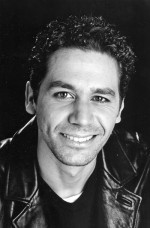Column Name
Title
Francisco Martinez joined the Juilliard Dance Division faculty in 2009. A native of Las Palmas, one of Spain’s Canary Islands, he graduated from the Royal Conservatory of Dance in Madrid and the Dance Education Laboratory at the 92nd Street Y, the Harkness Dance Center. He was a dancer with Spain’s Compañia Nacional de Danza and Belgium’s Ballet Royal de Wallonie, and has also been on the faculties of Sarah Lawrence College; Ballet Hispanico School of Dance, Peridance, Marymount Manhattan College, and the Ailey School (all in New York City); Long Island University; Boston Ballet School; and San Francisco Ballet School. He has also been a guest teacher for Les Grands Ballet Canadiens de Montréal and Ballet Jazz de Montréal; Boston Ballet; Compañia Nacional de Danza; Hubbard Street Dance Chicago; and Cedar Lake Contemporary Ballet and Alvin Ailey American Dance Theater (both in New York City).
Body
When did you first know you wanted to be a dancer and how did you come to know it?
I started doing gymnastics when I was 7 years old, and I always felt attracted to watching the women doing the floor routines with music. Moving my body with music was natural for me, and I did it often with my sisters, but men didn’t use music in our floor routines and my family didn’t want me to dance. My grandfather had been a percussionist in the orchestra in my home town, and I went to the Royal Conservatory of Music, where I did two years of solfège and preliminary classical guitar and piano. I liked it, but I didn’t have the patience at that time and my body was always unsettled. Then I started doing theater in the school, and it was really transforming. I really felt I belonged and was advised to dance since I was very good with movement. I started taking dance classes and I felt at home. Then I saw a performance by the National Ballet of Cuba, and l was impressed by the dancers, mostly the men, and I remember thinking, this is what I want to do with my life.
Who was the teacher or mentor who most inspired you when you were growing up and what did you learn from that person?
When I was 13, I had a drama instructor in school who inspired me a lot: he taught me to listen to my heart and to follow my dreams.
What dance performance have you attended that changed the way you think about dance?
When I was in school, I watched a video of Nederlands Dans Theater dancing Jiri Kilian’s choreography, and I was amazed, I loved it. I was impressed by the way he was able to fuse ballet technique and modern dance, by his use of the floor and the torso, and by the relationship of the music and the space. It was the end of the ’70s and I thought, “This is the next new thing and I want to dance like this.”
What’s the most embarrassing moment you’ve had as a performer?
Once I was dancing in Italy in a summer festival outdoors, and the stage was close to the sea. It was very humid at night, and the floor was wet and slippery. As soon as the show started, we dancers began to fall. They had to stop the show and try to dry the stage with the lights. It was embarrassing when you were on stage, but thank God after the show we were able to laugh about it and take it with humor.
If you could have your students visit any place in the world, where would it be, and why?
Paris. I would like them to visit the Paris Opera and to be in the city where ballet was born. The city has an allure that very much represents the essence of ballet.
What are your nondance-related interests or hobbies?
I like yoga: I am also a certified yoga instructor and have a very active personal practice.
What would people be surprised to know about you?
That I was born in the Canary Islands, which are seven islands in the Atlantic Ocean, 60 miles northwest of the African coast. They are part of Spain, and throughout history they have been a platform of emigration to America. So they are a place in between three continents—Africa, Europe, and North America—and coincidentally this has been my path in life: in America, I have gotten in touch with Eastern philosophy and Asian culture through yoga. I feel very fortunate! Another surprising thing is that the great tenor Alfredo Kraus was born in my hometown.
What is your favorite thing about New York City?
It allows you to be yourself. It is a city that forces you to know where you come from and that it doesn’t really matter where you are going. It teaches you to live on the verge.
If you weren’t in the career you are in, what would you be doing?
I like philosophy.
If your students could only remember one thing from your teaching, what would you want it to be?
Always remember to connect to your heart.





